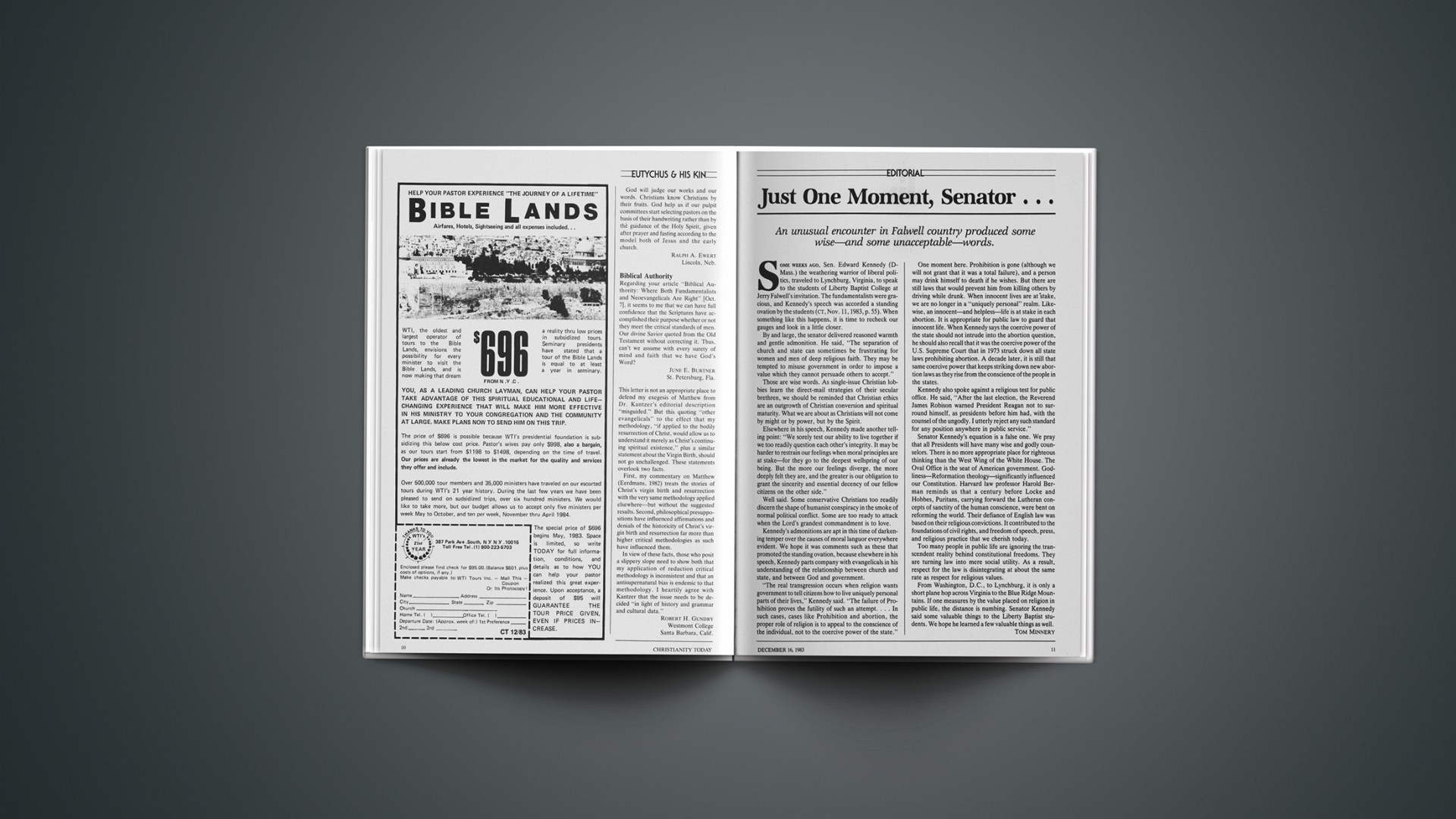An unusual encounter in Falwell country produced some wise—and some unacceptable—words.
Some weeks ago, Sen. Edward Kennedy (D-Mass.) the weathering warrior of liberal politics, traveled to Lynchburg, Virginia, to speak to the students of Liberty Baptist College at Jerry Falwell’s invitation. The fundamentalists were gracious, and Kennedy’s speech was accorded a standing ovation by the students (CT, Nov. 11, 1983, p. 55). When something like this happens, it is time to recheck our gauges and look in a little closer.
By and large, the senator delivered reasoned warmth and gentle admonition. He said, “The separation of church and state can sometimes be frustrating for women and men of deep religious faith. They may be tempted to misuse government in order to impose a value which they cannot persuade others to accept.”
Those are wise words. As single-issue Christian lobbies learn the direct-mail strategies of their secular brethren, we should be reminded that Christian ethics are an outgrowth of Christian conversion and spiritual maturity. What we are about as Christians will not come by might or by power, but by the Spirit.
Elsewhere in his speech, Kennedy made another telling point: “We sorely test our ability to live together if we too readily question each other’s integrity. It may be harder to restrain our feelings when moral principles are at stake—for they go to the deepest wellspring of our being. But the more our feelings diverge, the more deeply felt they are, and the greater is our obligation to grant the sincerity and essential decency of our fellow citizens on the other side.”
Well said. Some conservative Christians too readily discern the shape of humanist conspiracy in the smoke of normal political conflict. Some are too ready to attack when the Lord’s grandest commandment is to love.
Kennedy’s admonitions are apt in this time of darkening temper over the causes of moral languor everywhere evident. We hope it was comments such as these that promoted the standing ovation, because elsewhere in his speech, Kennedy parts company with evangelicals in his understanding of the relationship between church and state, and between God and government.
“The real transgression occurs when religion wants government to tell citizens how to live uniquely personal parts of their lives,” Kennedy said. “The failure of Prohibition proves the futility of such an attempt.… In such cases, cases like Prohibition and abortion, the proper role of religion is to appeal to the conscience of the individual, not to the coercive power of the state.”
One moment here. Prohibition is gone (although we will not grant that it was a total failure), and a person may drink himself to death if he wishes. But there are still laws that would prevent him from killing others by driving while drunk. When innocent lives are at stake, we are no longer in a “uniquely personal” realm. Likewise, an innocent—and helpless—life is at stake in each abortion. It is appropriate for public law to guard that innocent life. When Kennedy says the coercive power of the state should not intrude into the abortion question, he should also recall that it was the coercive power of the U.S. Supreme Court that in 1973 struck down all state laws prohibiting abortion. A decade later, it is still that same coercive power that keeps striking down new abortion laws as they rise from the conscience of the people in the states.
Kennedy also spoke against a religious test for public office. He said, “After the last election, the Reverend James Robison warned President Reagan not to surround himself, as presidents before him had, with the counsel of the ungodly. I utterly reject any such standard for any position anywhere in public service.”
Senator Kennedy’s equation is a false one. We pray that all Presidents will have many wise and godly counselors. There is no more appropriate place for righteous thinking than the West Wing of the White House. The Oval Office is the seat of American government. Godliness—Reformation theology—significantly influenced our Constitution. Harvard law professor Harold Berman reminds us that a century before Locke and Hobbes, Puritans, carrying forward the Lutheran concepts of sanctity of the human conscience, were bent on reforming the world. Their defiance of English law was based on their religious convictions. It contributed to the foundations of civil rights, and freedom of speech, press, and religious practice that we cherish today.
Too many people in public life are ignoring the transcendent reality behind constitutional freedoms. They are turning law into mere social utility. As a result, respect for the law is disintegrating at about the same rate as respect for religious values.
From Washington, D.C., to Lynchburg, it is only a short plane hop across Virginia to the Blue Ridge Mountains. If one measures by the value placed on religion in public life, the distance is numbing. Senator Kennedy said some valuable things to the Liberty Baptist students. We hope he learned a few valuable things as well.










